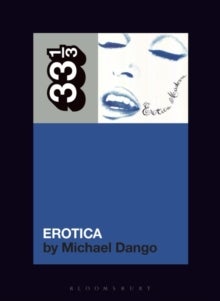
Madonna's Erotica av Michael (Beloit College USA) Dango
169,-
Everyone wanted Madonna¿s 1992 album <i>Erotica</i> to be a scandal. In the midst of a culture war, conservatives wanted it to be proof of the decline of family values. The target of conservative loathing, gay men reeling from the AIDS epidemic wanted it to be a celebration of a sexual culture that had rapidly slipped away. And Madonna herself wanted to sell scandal, which is why she released <i>Erotica </i>in the same season as her erotic thriller <i>Body of Evidence</i> and her pornographic coffee-table book simply titled <i>Sex</i>. But <i>Erotica </i>is more sentimental than pornographic. This ambivalence over sex is what makes the album crucial both for understanding its time and for navigating culture a generation later. As LGBT politics was transitioning from sexual liberation to civil rights like same-sex marriage, Madonna tried to do both. Her songs proved formative for works of queer theory, which emerged in the academy at the same time as the album. And <i>Erotica </i>was¿an








